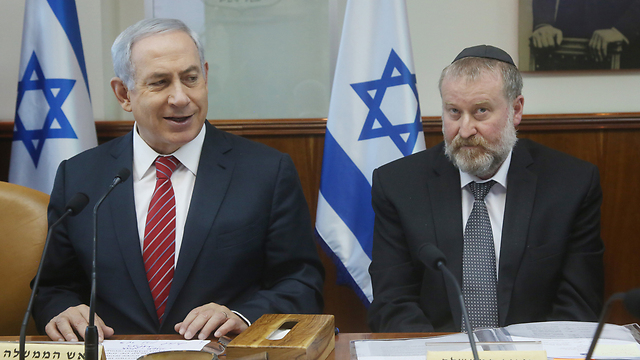
AG: 'If there is a need for an investigation, I won’t hesitate'
Avichai Mandelblit is marking six complicated months in office. Speaking at a meeting of the Knesset Constitution, Law, and Justice Committee, he reviewed how he sees his position in government, and some of the difficulties he’s experienced.
Mandelblit sees Shamgar’s career as a kind of guideline, and enjoys mentioning the parallels in their respective legal careers. For instance, both men served as IDF advocates general, and now they’ve both been attorneys general as well. Mandelblit says that when the IDF Advocate General’s Offices were moved into the Kirya base in Tel Aviv, leaving its old offices across the street, he personally made sure his photo was hung right below that of Shamgar on the wall commemorating those who led the office across the years.
For the past six months, he’s been trying to gain some inspiration from Shamgar in his current role as AG. And indeed, in his first appearance at the Knesset’s Constitution, Law, and Justice Committee, Mandelblit showed confidence and focus, alongside calm and humility. When asked about the hot potato thrown into his lap – investigating Prime Minister Neytanyahu – he neither avoided the question nor seemed unnerved by it.
“It’s not easy for me, as the head of the prosecution who’s running an inquiry on the prime minister, to (also) have a work relationship with him, which demands frequent consultations, sometimes one-on-one,” he said.
Mandelblit continued, “It’s not the easiest or most comfortable thing for me to sit with the prime minister in work meetings that have to do with legal advice. Now that there’s an inquiry into his affairs, I can’t speak to him and he doesn’t ask me (about the matter). But we are still in touch. This is a question of professionalism – and you need to trust me to make that separation.”
The AG stood on much sturdier ground when asked about the professional side of the inquiry. He said that his top priority is preserving the public’s trust in his office, and explained that he is aware of the fact that the speed with which he makes decisions on the matter will greatly influence this trust.
Nevertheless, Mandelblit says he will not be hasty in his decision-making. “Some of these decisions are crucial, and so we need to be very careful. We aren’t looking to hang people in the public square, and so I’ll work as professionally, cleanly, correctly, and quickly as possible.”
Mandelblit doesn’t back down from criticism over his insistence in calling this process a “check” or “inquiry” as opposed to an “investigation.” “When there’s a reasonable suspicion that (a criminal offense) has been committed, you have to switch to an investigation,” he said, “but in a complex situation in which there’s no reasonable suspicion but only initial information, an inquiry must be commenced.”
The AG continued, “The second criterion to distinguish an inquiry and an investigation is the suspect's status: When (the subject) holds a high position you can’t ignore information, but as long as there’s no reasonable suspicion you need to be careful, because there are consequences for those being investigated.” Even so, he emphasized, “Not one will be immune, and if there is a need for an investigation, I won’t hesitate.”
Later on, Mandelblit spoke of how he saw his role as attorney general, defining it as “helping the government ministers and the ranks of elected political officials implement their policies.” He said he was not pleased by the fact that the attorney general was nicknamed “the country’s true manager,” implying the position’s great power.
“I strenuously oppose that,” he said, “There is a (government), and we want to help (it) achieve (its) policy within the borders of the law. My goal is the government, any government, being able to implement its policy. The government offices’ legal advisors have to be attentive to (the ministers) and accept (their) directives. I expect there to be good relation between the advisers and the management ranks of the (ministries).”
Mandelblit differentiated between opinions issued by the AG which point to “legalistic incapability” and opinions that point to “legalistic difficulties.” The former means that there is no way to accept the government’s desired move, since it is clearly illegal or unconstitutional, but the latter merely indicates that there are some legal problems with the decision, and that the government can still make that decision knowing that there is the possibility of it being struck down by the courts.

In both cases, Mandelblit emphasized, the goal of the attorney general is to create a dialogue with decision makers in order to improve the decisions as much as possible from a legalistic standpoint. As an example, he brought up his striking down of the proposed bills meant to legalize the status of the illegal Amona settlement outpost and his attempts to find another solution for the problem.
The AG explained that, other than in rare cases, he opposes ministerial demands to appear before the High Court of Justice (HCJ) themselves, and advocate for decisions struck down by the AG. “The state needs to speak with one voice before the HCJ, and this (is done) via the AG’s representatives,” he said, “Otherwise it all falls apart.”
Mandelblit was and remains strongly opposed to the idea of splitting his institution into two – a prosecution wing and a governmental advisory wing. He is aware of its advantages, especially considering his own delicate situation of the moment – having to both advise the prime minister and lead the inquiry into his affairs – but at the end of the day, he claimed that he was, “worried that a split would cause the weakening of the rule of law.”
According to Mandelblit, the fact that both roles are held by the same person allows that person to have a wider view of the Israeli political and legal landscape. In addition, he believes a split can cause excessive investigations on one hand and excessive advising on the other. “Today, there’s a high level of faith in the institution, and I worry that a split will constitute too big of a gamble,” he summarized.










